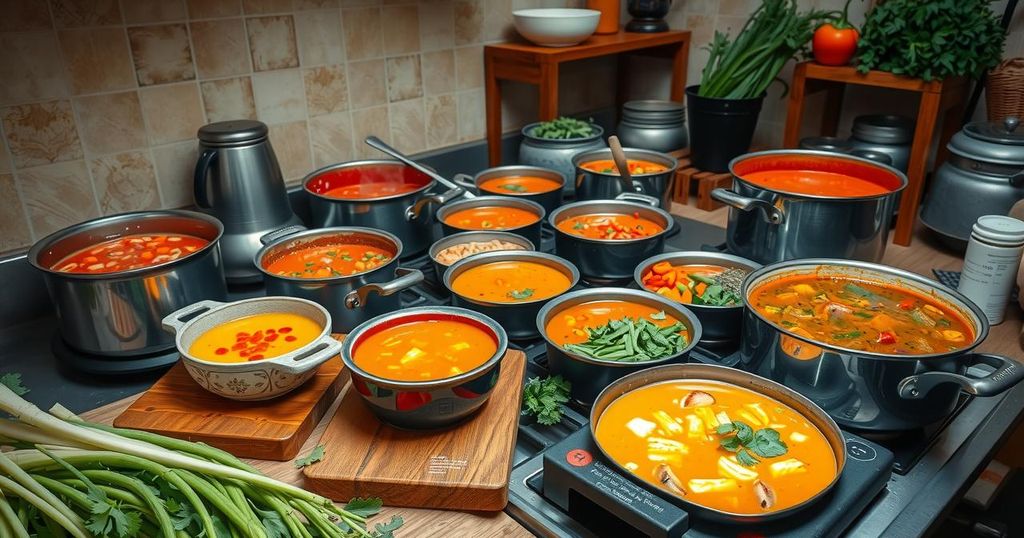Understanding Moroccan Eating Habits During Ramadan: Tradition Meets Modernity
Ramadan in Morocco has become synonymous with both cultural richness and challenges associated with consumer habits. While households embrace traditional iftar gatherings filled with elaborate dishes, the surge in food waste and rising costs trigger significant health concerns. Addressing these issues through mindful practices can lead to more fulfilling observance of this sacred month.
The sacred month of Ramadan, observed by Muslims worldwide, has notably transformed daily practices in Morocco. As the second week of fasting unfolds, banks, businesses, and schools have adjusted their hours, contributing to heightened supermarket activity. Families have been diligently preparing for iftar and suhoor meals, with women planning elaborate dishes to be shared at the table after sunset.
Recent studies indicate that food consumption in Morocco during Ramadan can surge by 40% to 50%, attributed to impulsive buying and excessive meal preparation. Iftar tables become central to family gatherings, showcasing an abundance of rich dishes prepared explicitly for breaking the fast. Unfortunately, this tradition often results in significant food waste, countering the month’s intended values of care for both body and soul.
The food waste during this period is staggering, with families reportedly discarding substantial amounts of prepared food. This phenomenon strains household budgets, particularly as the costs of essential ingredients have soared. While Ramadan embodies themes of gratitude, the current consumer habits align with rising food expenses, significantly impacting lower-income households.
For many women, including Maria, Ramadan represents a period of substantial pressure and fatigue rather than spiritual reflection. Maria expresses her frustration over the demands for elaborate iftar meals, which often lead to waste. She laments the cultural expectation for abundance and advocates for the need to reassess these practices.
In contrast, some individuals are adapting their iftar routines. Shaima, a public sector employee, explains how her work schedule has encouraged her to prioritize balanced meals over lavish spreads. This shift reflects a broader sociological trend wherein many prioritize taste and quantity over nutritional quality, further perpetuating a culture of excess.
Professor Ahmed Drissi observes that Ramadan traditions have shifted greatly due to influences from media, economic changes, and evolving societal norms. Where simple meals were once the norm, extravagant iftar displays have emerged, influenced by rising incomes and social media. This has transformed the essence of Ramadan into a time associated more with indulgence than community spirit.
The health ramifications of these consumption habits are increasingly evident, according to Dr. Faiçal Serrou, who notes a rise in digestive issues among patients during Ramadan. Overindulgence at iftar, particularly with high-sugar and high-fat foods, can trigger various health problems. Medical professionals recommend moderation and balance, emphasizing the importance of incorporating healthy options into the iftar menu.
Nutritionist Mariam Khaldi concurs, advocating for mindful eating and portion control as essential components for maintaining both physical and spiritual well-being during Ramadan. She emphasizes the need to shift focus from mere quantity to quality in food choices to foster lasting health benefits while observing this important month.
In conclusion, Ramadan in Morocco reflects a rich tapestry of cultural traditions intertwined with modern consumer behaviors. While the observance is intended for spiritual elevation and community bonding, it has also led to increased food waste and health concerns. Through a collective reassessment of priorities—balancing tradition with moderation—communities can embrace a healthier and more meaningful Ramadan. As individuals begin to reconsider their iftar practices, a possible transformation towards more sustainable and health-conscious habits may provide a vital opportunity for both physical and spiritual rejuvenation during this holy month.
Original Source: www.moroccoworldnews.com




Post Comment